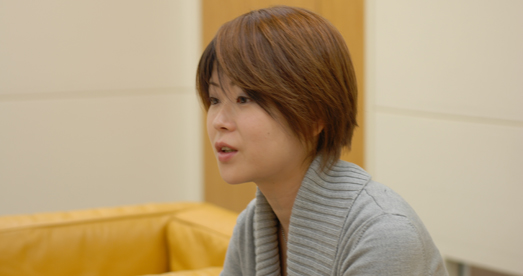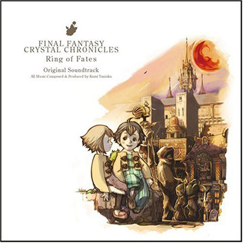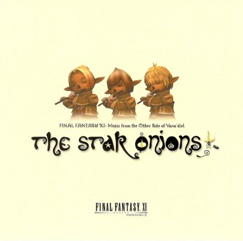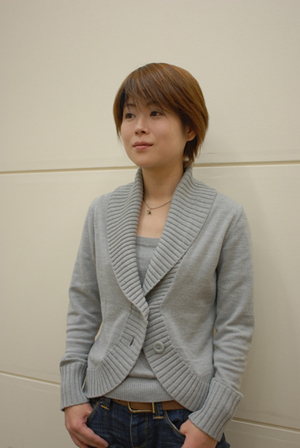by Jeriaska, with translation by Takahiro Yamamoto - 03/29/08

Since 1998, Kumi Tanioka has composed and performed music for Square Enix game titles. Her debut for the company was the action role-playing game Chocobo's Mysterious Dungeon 2 for the Sony Playstation. Recently, she has come full circle, composing the two original non-vocal tracks for the Wii dungeon-crawler Chocobo's Mysterious Dungeon: Labyrinth of Forgotten Time.
Though her contributions to videogame music so far are bookended by these two similar game titles, the composer's work for Square Enix has been marked by notable variety. She contributed to the score for the first massively multiplayer online game in Final Fantasy's history, together with the flagship series' original composer Nobuo Uematsu, and musician Naoshi Mizuta. Her songs have been featured in the Xbox 360 science fiction shooter Project Sylpheed, live recordings of her compositions for Final Fantasy Crystal Chronicles included accompaniment by ancient historic instruments, and she has performed live on the electronic keyboard as part of the Star Onions band.
Her latest piano solo performance can be heard on the original soundtrack to the recently released Final Fantasy Crystal Chronicles: Ring of Fates for the Nintendo DS. RPGFan recently had the chance to speak with the composer on the subject of her music for Square Enix and the latest title in the Crystal Chronicles series of games.
RPGFan: Kumi Tanioka, thank you for offering your time to the readers of RPGFan.
Tanioka: Thank you for this opportunity to share with English-speaking listeners of our music.
RPGFan: As many people who listen to your music already know, both the original soundtracks for Project Sylpheed and Final Fantasy Crystal Chronicles: Ring of Fates contain recordings of your live piano performances. Previously in the history of the company, Final Fantasy Piano Collections albums have been performed by someone other than the composer. How was it determined that these songs included in the original soundtrack would be played by yourself?
Tanioka: The answer is that I like playing piano. I often perform when it feels that the sound of the piano is suited to a project. During the process of making the soundtrack for Ring of Fates, the idea came up of adding a bonus track. So, I suggested, "I'd like to play a medley on the piano." I might add, I do not write sheet music for when I play. I construct the song by playing freely. The medley for Ring of Fates was created by improvising several times.

RPGFan: Ring of Fates incorporates the distinct style you developed for the original Final Fantasy Crystal Chronicles for the Nintendo Gamecube. Did you consider how you might go about further developing the musical themes of the series?
Tanioka: I should start by mentioning that when I was involved in the original Crystal Chronicles I was looking at the illustrations of the game world and thought of world music. More like world music in a broad sense, where music is not limited to a single country or culture. I thought that would be perfect for this game. Also, at that time I think it was fortunate that [Hidenori] Iwasaki, who was the synthesizer operator, came across a music group called "ROBA House" that played traditional and ethnic music.
The music of Final Fantasy Crystal Chronicles was created as I externalized this notion of what I believed to be perfect for the game, and at the same time I learned about the distinct characteristics of assorted regional music. Also, I truly enjoyed composing. I believe the talent of Iwasaki-san who did the fantastic technical work without losing the sense of the game world was one of the greatest factors in bringing out the significance of that world.
As for Ring of Fates, compared with previous work, I did not compose with world music in mind. Although it is the same "Final Fantasy Crystal Chronicles," Ring of Fates was based on the concept of creating a new landscape containing the same atmosphere. I composed the music purposefully without having the notion of world music in mind. For this one, I was more emotionally involved in the characters and created the music through lots of trial and error. Though people say that both scores match musically or match my personality, I was not thinking about my own style. But, as long as I compose, it might just be the case that it is my personality that will naturally come out as a result.
RPGFan: You worked together with Yasuhiro Yamanaka to lend some subtle sounds to the Nintendo DS. Was it hard to create such a quality on a handheld console?
Tanioka: For this, it is the triumph of my friend Yamanaka's talent. Though there were lots of things I paid attention to as I composed with the DS in mind, since it has some limitations, at the end of the day he was the one who actually made it happen for the game system. I have great appreciation for his work. He grasped my intention and took that direction into consideration, which is reflected in the game itself.

RPGFan: Late last year, Square Enix held an event in Osaka to promote the "Wings of the Goddess" expansion pack for Final Fantasy XI. You performed seven songs together with the Star Onions band. Can you tell us a little about the history of the Star Onions and your involvement in the group?
Tanioka: I was part of the original staff of Final Fantasy XI. After the release of the game, we began discussing the possibility of performing live at a fan event. That was when The Star Onions was formed. Mizuta-san, who composed most of the music for Final Fantasy XI, is the lead member. I joined because I was involved in the project, and I've participated at every event since.
RPGFan: Do you find it at all difficult to play solo performances on the piano that are based on electronic music found in games?
Tanioka: Yes, though it depends on the track itself. There are times when it can be fairly difficult to arrange a song for the piano. While I am careful not to disrupt the overall flow and the atmosphere of the song, I add some elements that make it more conducive to a piano performance. At first I thought that a track like "Awakening" would be impossible to adapt for the piano, so I'm very relieved that people have enjoyed the results.
RPGFan: What would you say are some past examples of music that has inspired your creativity?
Tanioka: Well, I studied piano since I was young, and I was a member of a chorus in adolescence. I believe classical music, especially piano and chorus music has been the basis for my style, as well as the biggest influence. I also enjoy varieties of world music, such as Indonesian, Irish and Balinese music. I try to listen to a variety of music from many regions of the world, not limited to any particular genre. I suppose that hearing elements of an assortment of musical types may well have influenced my music on a subconscious level.

RPGFan: What have you found particularly meaningful about your various collaborative efforts?
Tanioka: When I compose by myself the music is created within my own world, in a good or bad sense. However, in collaboration, by listening to other composers' music, I get to encounter personalities or skill formations that I myself don't have. From there, my musical understanding is improved and new possibilities open up. Also, in collaboration, because we create a particular world as a group, the more I invest my emotions in the game, the more meaningful it becomes to carefully build a relationship with the music of the other composers. Also, to put it simply, it's really fun to share each other's music.
RPGFan: What can you tell us about your upcoming musical projects?
Tanioka: I was in charge of the music for the WiiWare game being released this Spring in Japan called Final Fantasy Crystal Chronicles: My Life as a King. This game is another of the stories in the world of Final Fantasy Crystal Chronicles. As for the music, it is in a slightly different style from the first Crystal Chronicles and Ring of Fates. I was conscious to create music with the same atmosphere. It would be an honor if when playing the game you enjoy the music.
RPGFan: Ms. Tanioka, thank you for this chance to learn more about your music.
Tanioka: Thank you very much.
Interview conducted by Jeriaska. Translated by Takahiro Yamamoto.
Coordinated by Soushi Yoshida.